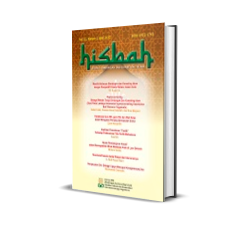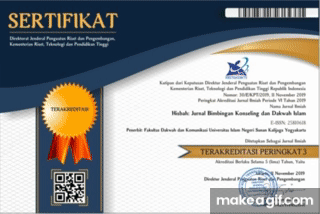INTEGRATING MULTICULTURALISM IN ISLAMIC COUNSELLING: A PHENOMENOLOGICAL ANALYSIS OF THE MUSLIM COMMUNITY IN MELAKA, MALAYSIA.
DOI:
https://doi.org/10.14421/hisbah.2024.212-06Abstract
Multiculturalism plays a significant role in shaping the dynamics of Islamic counseling, particularly in diverse communities such as the Muslim population in Melaka, Malaysia. This study explores the integration of multiculturalism in Islamic counseling through a phenomenological analysis of the lived experiences of Muslim individuals in Melaka. The research aims to examine how cultural diversity influences counseling practices, the challenges faced by Islamic counselors in a multicultural society, and the strategies employed to provide effective and culturally sensitive support.
Using a qualitative phenomenological approach, data were collected through Focus Group Discussions (FGD), participatory observation, and document analysis. The findings indicate that cultural diversity within the Muslim community in Melaka significantly impacts counseling practices, requiring counselors to develop multicultural competencies alongside their Islamic counseling expertise. Participants highlighted the importance of integrating religious values with cultural awareness to ensure counseling approaches remain relevant and effective. Additionally, the study reveals that the interweaving of religious identity, traditional beliefs, and modern psychological practices poses both opportunities and challenges for Islamic counselors.
This research contributes to the growing discourse on multicultural counseling by emphasizing the need for Islamic counselors to adopt a holistic approach that considers cultural, religious, and psychological dimensions. The study suggests that incorporating culturally adaptive strategies, fostering interfaith understanding, and collaborating with religious scholars can enhance the effectiveness of Islamic counseling in multicultural contexts. The findings underscore the necessity for structured training programs that equip counselors with both Islamic knowledge and multicultural sensitivity to better serve Malaysia’s diverse Muslim community.
References
Ahmad, N., & Sulaiman, R. (2019). Integrating modern psychotherapy with Islamic counseling: Challenges and opportunities. Kuala Lumpur: Islamic Psychology Press.
AIHCP. (2024, September 18). Multi Cultural Counseling Challenges within the Arab/Islamic Community. American Institute of Health Care Professionals. Retrieved from https://aihcp.net/2024/09/18/multi-cultural-counseling-challenges-within-the-arab-islamic-community/
Al-Attas, S. M. (2018). Islamic psychology and the spiritual dimensions of counseling. Singapore: Crescent Academic.
Associated Press. (2024, September 24). Federal officials say Michigan school counselor referred to student as a terrorist. AP News. Retrieved from https://apnews.com/article/cf1f54bcce902bf15dc19fe043403a10
Ayob, N. S. M. (2021). A local approach toward multicultural counseling in Malaysia. International Journal of Human Resource Studies, 11(4S), 287-306. DOI: 10.5296/ijhrs.v11i4S.19254
Bahauddin, A., & Ahmad, H. (2018). Sufism in the architectural typology of the Melaka Tengkerah Mosque, Malaysia. International Journal of Heritage Architecture, 2(1), 131-140. DOI: 10.2495/IHA180131
Habibinia, M., Wong, A., & Li, A. (2023, April 28). New therapy platform aims to bridge gap between faith and mental health support for Muslim community. The Green Line. Retrieved from https://toronto.citynews.ca/2023/04/28/mental-health-muslim-community/
Hashim, H. (2019). Cultural practices and religious ethics in Islamic counseling: A Malaysian perspective. Journal of Islamic Counseling Studies, 7(2), 45-63. DOI: 10.24035/ijit.04.2013.001
Hassan, M. (2020). Community-based mental health support in Islamic societies.” International Journal of Muslim Mental Health, 15(1), 78-92. DOI: 10.4324/9781003453413
Hassan, S. A., & Peh, K. S. (2014). An Islamic perspective on multicultural counselling: A Malaysian experience of Triad Training Model (TTM). Middle-East Journal of Scientific Research, 19(1), 54-60. DOI: 10.5539/ass.v17n11p18
Hassan, S. A., & Shuen, P. K. (2014). An Islamic perspective on multicultural counselling. Middle-East Journal of Scientific Research, 19(1), 87-91. 10.21043/kr.v11i1.6435
Ismail, R. (2023). Mindfulness and cognitive therapy in Islamic psychology: A case study in Malaysia. Kuala Lumpur: Mindful Islam Press.
Mahmud, Z. (2021). Language barriers in multicultural Islamic counseling: Implications for practice. Asian Journal of Counseling, 9(1), 112-127. 10.4324/9781003453413
Qasqas, M., & Jerry, P. (2014). Working with Muslim clients: Adopting multicultural and social justice counselling competencies. CERIC. Retrieved from https://ceric.ca/2021/01/working-with-muslim-clients-adopting-multicultural-and-social-justice-counselling-competencies/
Rahim, F., & Fauzi, N. (2021). Training multicultural Islamic counselors: A curriculum development approach. Journal of Islamic Counseling Education, 6(3), 56-73. 10.35445/alishlah.v14i4.2332
Rahman, A. (2020). Multicultural competence in Islamic counseling: A Southeast Asian perspective. International Journal of Islamic Psychology, 14(2), 29-46. DOI: 10.21043/kr.v11i1.6435
Why Islam. (n.d.). Counseling Muslims: A Culturally-Informed Approach. Retrieved from https://www.whyislam.org/counseling-muslims-a-culturally-informed-approach/
Yusuf, N., & Said, F. (2022). The intersection of culture and faith in Islamic counseling: A qualitative analysis. Journal of Muslim Mental Health, 17(4), 87-105. DOI: 10.4324/9781003344827
Downloads
Published
Issue
Section
License
Authors who publish with this journal agree to the following terms:
- Authors retain copyright and grant the journal right of first publication with the work simultaneously licensed under a Creative Commons Attribution License that allows others to share the work with an acknowledgement of the work's authorship and initial publication in this journal.
- Authors are able to enter into separate, additional contractual arrangements for the non-exclusive distribution of the journal's published version of the work (e.g., post it to an institutional repository or publish it in a book), with an acknowledgement of its initial publication in this journal.
- Authors are permitted and encouraged to post their work online (e.g., in institutional repositories or on their website) prior to and during the submission process, as it can lead to productive exchanges, as well as earlier and greater citation of published work.












